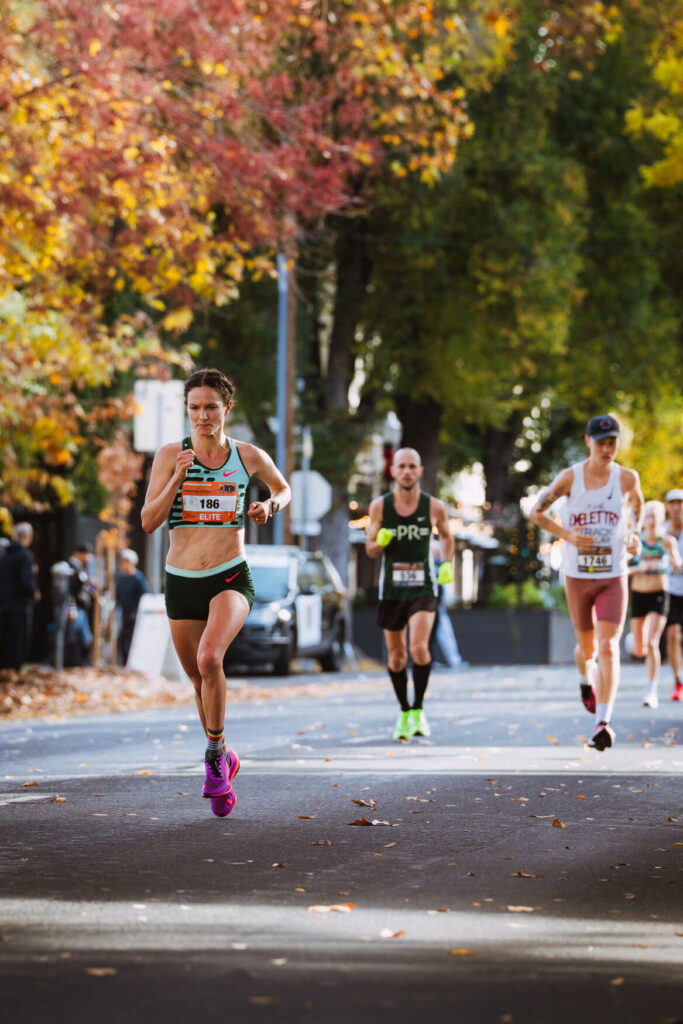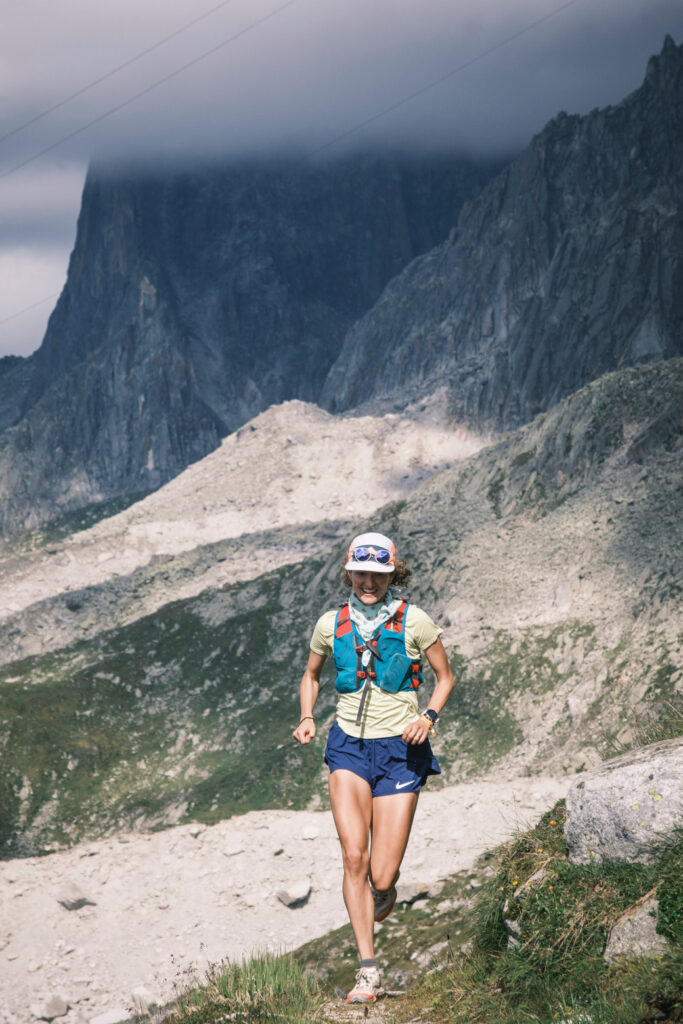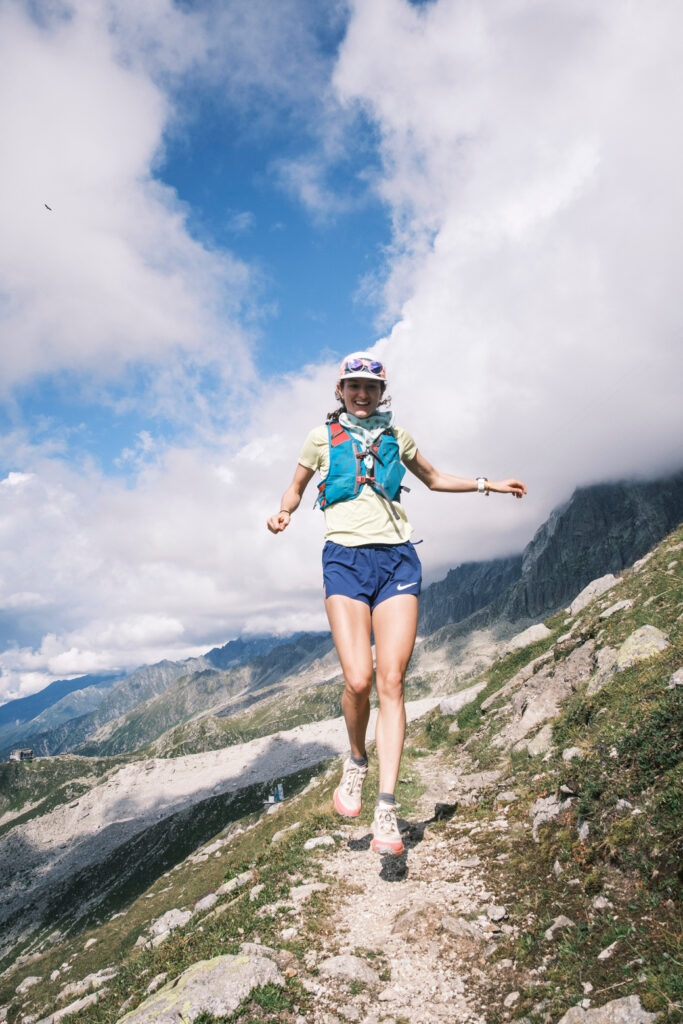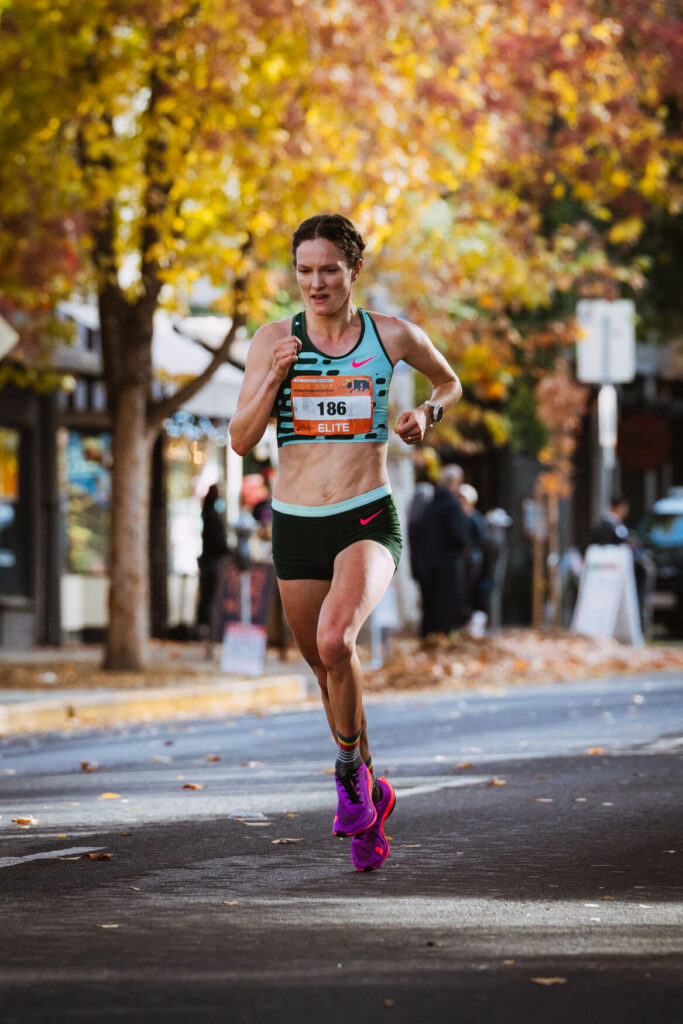Elite athletes and their coaches routinely use the 4 years between the Olympic Games as the basis for their training macrocycle. For Rachel Drake, the 4 years since her 59th place finish at the 2020 US Olympic Marathon Team Trials have been anything but routine: pregnancy and the postpartum running comeback; breastfeeding and raising her newborn; stress fracture and injury setbacks; major trail racing success; graduating medical school, and more. Oh, and by the way, Drake found the time to set a 5-minute marathon PR, qualifying for the 2024 Olympic Trials! For more on trail runners taking on the Olympic Trials, check out this piece from last month.

Rachel Drake is no stranger to the world of elite road running, or the US Olympic Marathon Team Trials for that matter, having raced in the 2020 trials in Atlanta, where she finished 59th out of 517 qualifiers! Before the 2020 trials, Drake honed her craft on Europe’s technical trails in challenging conditions, placing 7th at UTMB’s CCC (101-kilometer) race in 2019. It’s no surprise she handled the hilly streets and windy weather of Atlanta so well. Fast-forward to 2024 and Drake has once again qualified for the US Olympic Marathon Team Trials off the back of a stellar trail season that included a 6th place finish at UTMB’s shorter companion race, the OCC 55-kilometer event.
Talking with Drake about how she went about planning her 2023 racing calendar was revealing: on the comeback from pregnancy in 2022 and a stress fracture in February of 2023, Drake’s sights were set on the OCC by UTMB in late August. All eyes on this gnarly alpine mountain race, Drake headed to Europe two months out for, in her own words, “racing practice and also to gain information about my strengths and weaknesses.” Drake believes these preparation races highlighted a need to first work on her climbing ability, then later on faster running, culminating in Drake’s “really good day at OCC” and 6th place finish.
Pursuing an OTQ and a road marathon PR…
Still a relatively niche sport, few outside of the elite trail running world appreciate the magnitude of Drake’s top-10 UTMB Finals finishes: qualifying for the Olympic Trials garners a different reaction. Having qualified for the 2020 US Olympic Marathon Team Trials with a 2:40:17 run in 2019, this time around Drake needed to run over 3 minutes quicker to qualify under the 2:37:00 time standard. On a quest to regain speed after the birth of her baby, as well as the allure of “OTQ-ing”, Drake was motivated by this “challenging but attainable” qualifying time and the opportunity to train with members of the Bowerman Track Club Elite team.
… without sacrificing trail time
Similar to fellow OTQing trail runner Christian Allen, who you can learn more about here, Drake entered fall marathon training off the back of a summer of trail racing, chasing vertical gain over mileage and splits. Switching between the trails and road, sub-ultra distances, and ultramarathons, rather than staying siloed in one event type, is becoming increasingly common, and for good reason. Drake says, “After a summer of a lot of trail running, it just feels good to switch gears and do something that feels completely different, almost like a different sport. Even though I had just come off a pretty busy summer of racing, I felt really mentally fresh when it came to hitting splits and running fast.” And to those roadies who worry that slower running on the trails comes at the cost of their continued marathon progression take reassurance from Drake, “I don’t think I ran a single sub 6:00/mile over the summer, and then I was training to run 26.2 of them in a row.” Drake’s 2:35:28 marathon following this training block equates to 26.2 miles at a 5:56/mile pace, minutes per mile faster than she averages on the trails.

The trail-road crossover: how trail running can improve road performances
Perhaps you’re reading this thinking Drake is just an outlier, gifted with natural speed that doesn’t need to be trained for months, and that trail running can’t possibly make you a faster road runner. You are right in thinking that Drake is a phenomenally talented athlete, that part is true, but you’re going awry in thinking that “us mere mortals” can’t benefit from time on trails at slower paces.
As Drake attests to after a summer traversing Europe’s most rugged routes, the varied and challenging trail terrains, along with the longer race durations, demand greater mind and muscle engagement, leading to increased mental and physical strength and resilience. Drake likens running up to your potential to riding a red line, believing that “getting used to being in that uncomfortable place for longer, trail runners have a really thick red line.” This proves to be a game-changer for trail runners, as Drake puts “desensitizing them to time on feet”, enabling them to endure discomfort for extended periods and push their limits during a marathon.
“If you really think about it, running a fast 50k takes 4 hours or more, while a fast marathon is less than 3. So, when it came to CIM, I wasn’t at all nervous about the marathon distance, or the total time that I would be out there, because I had been out there for five times longer during a 100k [referencing a 100-kilometer race] and twice as long as running a 50k – I knew that I could endure it. I feel like that’s definitely a benefit that people wanting to run a fast road marathon would benefit from.”
Fueling is another reason trail runners often have the edge over roadies when it comes to marathon execution, where proper nutrition is crucial for peak performance, as discussed in this previous article. With races lasting hours to days, the culture of eating and frequent fueling for sustained energy becomes ingrained in trail running. She intentionally trained her gut to handle nutrition on the run for many hours on end, Drake found herself able to fuel more frequently than her road-only training buddies without experiencing GI distress.
“I would say that I think my ability to eat definitely helped me in the road marathon. The people that I trained with were always very impressed with how much I could eat. I had never really thought much of it, I just felt it was normal. But when we would do our long runs, I was eating a ton in comparison, and they would comment that my ability to keep eating was going to greatly benefit my marathon.”
Road running as a tool for trail runners
Like Drake, who sees “the roads as a great tool for improving trail running”, the majority of trail runners could benefit from using the roads strategically. Drake believes that, “the speed and short contact time with the ground [honed through road racing] is so useful on the trails, especially for technical trails” where runners’ foot placements need to quickly react to the ever-changing terrain.

Additionally, due to its increased popularity, the roads often allow athletes to benefit from the group effect and social aspects of running through training with others, such as by joining a local running club or workout group, just like Drake did. Not only does the camaraderie built through shared runs increase enjoyment and make the miles fly by, but group training can decrease one’s perceived exertion and fatigue level, and there is interesting research to support this. A 2021 study examining the relationship between community support fostered through running with others, and feelings of enjoyment, fatigue, and energy as well as objective performance metrics, correlated higher subjective levels of community support with lower ratings of fatigue, higher feelings of enjoyment and energy, and improved performance (1). Put simply, training with others makes you faster and makes running feel easier! While these benefits are not unique to road running, group training options for trail running can be very limited based on where you live, so joining a local group for some shared road miles is certainly an option worth considering.
Plans for the Olympic Trials and beyond
Despite finishing in the top 15% of America’s best at the 2020 Olympic marathon trials, and with a new 2:35 marathon PR to her name, Drake’s racing priorities remain on the trails. Refusing to be defined by any one running identity, Drake is the epitome of a hybrid runner, performing at an elite level on the roads and trails simultaneously.
“I don’t feel totally like a fish out of water on the roads, and I really enjoy it, but my heart is in the dirt: I love the trails and that’ll always be my home.”

Looking ahead to the fast-approaching Olympic Trials, Rachel Drake is not a name you’ll be seeing on the start list, and for good reason. While her presence will certainly be missed by us trail fanatics rooting for one of ‘our own’ on the streets of Orlando, Drake has her eyes set on qualifying for this year’s Western States Endurance Run (WSER) at the Black Canyon 100-kilometer Golden Ticket race a week later.
“I see the roads as a tool to improve my trail running, and I really think the training block for CIM leads nicely into a training block for Black Canyon. I’m sad that I won’t be at the trials, but with Black Canyon a week after, it just doesn’t work: it takes me longer than a week to recover from a marathon!”
Drake’s recent win at the Hong Kong “The Triple” 33-kilometer race (associated with the World Trail Major event, The Hong Kong 100-kilometer) shattering the course record by 40 minutes, affirms her belief that “road racing has made me a much better trail runner as well”, and suggests she’s in peak form heading into Black Canyon. Drake will need to place among the top 3 female finishers in order to secure her spot on the 2024 WSER start line. We’ll be cheering for her extra loudly on February 10th.
While Rachel Drake will not be in Orlando you can catch top trail runners like Christian Allen and Peyton Thomas as they duke it out with the nations best roadies at the 2024 US Olympic Marathon Team Trials on February 3rd. For the names of more trail runners racing the Olympic Trials see this recent article: “Trail Runners to Take on Olympic Marathon Trials”.
References
(1) Davis, A. J., MacCarron, P., & Cohen, E. (2021). Social reward and support effects on exercise experiences and performance: Evidence from parkrun. PloS One, 16(9), e0256546. https://doi.org/10.1371/journal.pone.0256546
